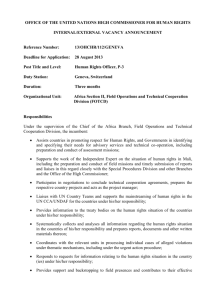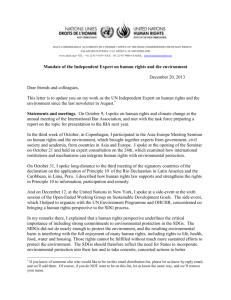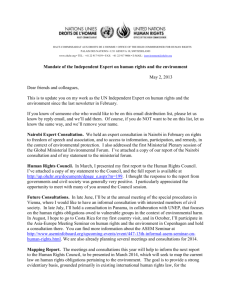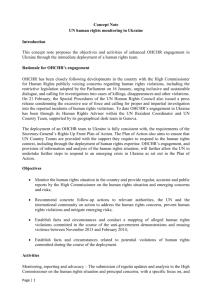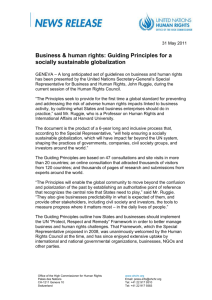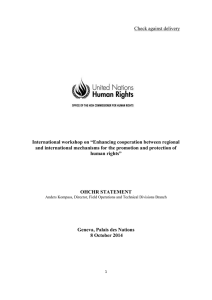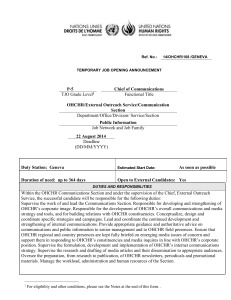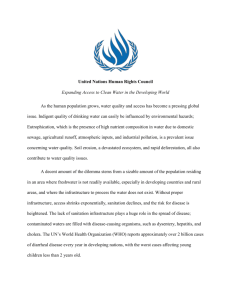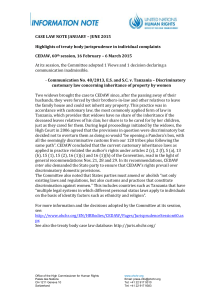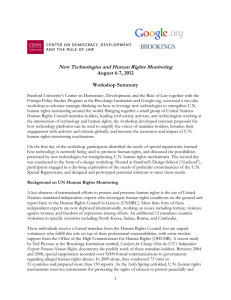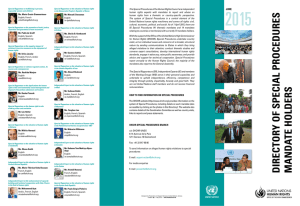THE UNITED NATIONS COMMISSION ON SCIENCE AND TECHNOLOGY FOR DEVELOPMENT
advertisement
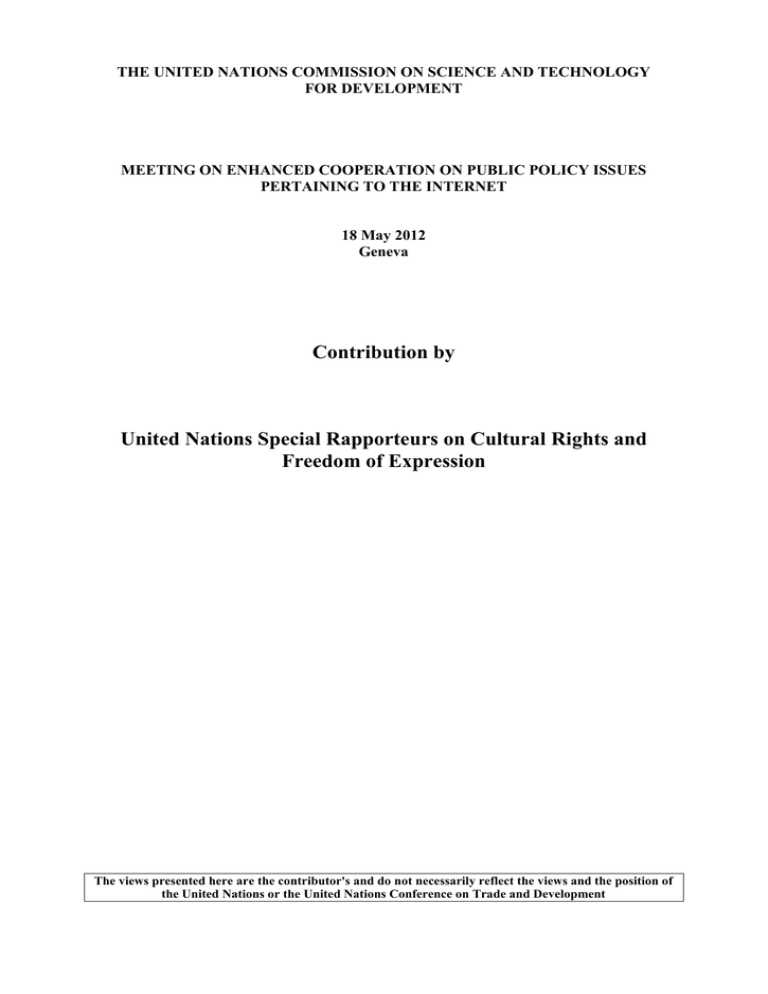
THE UNITED NATIONS COMMISSION ON SCIENCE AND TECHNOLOGY FOR DEVELOPMENT MEETING ON ENHANCED COOPERATION ON PUBLIC POLICY ISSUES PERTAINING TO THE INTERNET 18 May 2012 Geneva Contribution by United Nations Special Rapporteurs on Cultural Rights and Freedom of Expression The views presented here are the contributor's and do not necessarily reflect the views and the position of the United Nations or the United Nations Conference on Trade and Development “It is crucial to address who and what shapes the Internet today” – UN expert on cultural rights (GENEVA. 18 May 2012) – “With the Internet becoming such a powerful medium through which individuals exercise a wide range of human rights, it is crucial to address who and what shapes the Internet today,” said the United Nations Special Rapporteurs on cultural rights, Farida Shaheed, and on the right to freedom of opinion and expression, Frank La Rue, adding that a “human-rights based approach to the issue should always be adopted”. “Since the Internet is essentially a global resource, it is crucial that appropriate Internet governance supports the right of everyone to have access to and use information and communication technologies in self-determined and empowering ways,” the experts stressed prior to today’s meeting in Geneva of the UN Commission on Science and Technology for Development to discuss policy issues regarding Internet governance.* Given the urgency to arrive at a global consensus on Internet governance and architecture, the Special Rapporteurs welcomed the first steps taken to discuss these issues in an inclusive way, noting the demand expressed by some civil society organizations for a democratization of the global governance of the Internet. “The Internet has become a key element for the enjoyment and the promotion of human rights such as the right to freedom of opinion and expression, including the right to seek, receive and impart information and ideas of all kinds regardless of frontiers; the right to share and enjoy the benefits of scientific progress and its applications; the right to participate in cultural life and engage with others through inter-cultural dialogue; as well as the right to development,” they noted. “As such, it can also play an important role to promote democratic participation, accountability, transparency and economic development”, the experts said. “It is therefore vital to safeguard the immense potential of the Internet to promote human rights, and to maintain it as a global resource for all to enjoy.” Ms. Shaheed and Mr. La Rue underlined the need to ensure that the Internet is not parceled into ‘national spheres’ and to guard against any monopolistic appropriation of the Internet, which could seriously reduce the public spaces where social actors interact as equals. In their view, “it is important that Internet governance policies and architecture promote public spaces on the Internet and be based on open and public standards.” Moreover, they highlighted that discussions surrounding policy issues should seek to pinpoint basic principles to guide the development of the architecture of the Internet, fully taking into consideration all human rights and the principles of equality and nondiscrimination. “The principle of net neutrality, whereby all content is treated equally Office of the High Commissioner for Human Rights Palais des Nations CH-1211 Geneva 10 Switzerland www.ohchr.org Email: press-info@ohchr.org Tel: +41 22 917 9310 Tel: +41 22 917 9383 over the Internet, is a foundational principle of the Internet and should be upheld”, they stressed. “The Internet started as a collegial enterprise of communication and sharing informed by the principles of equality, non-interference and non-hierarchy,” the Special Rapporteurs said. “Its architecture was constructed in a manner which ensured that the flow of content was independent of the carrier infrastructure, making it very difficult for anyone to control the flows on the Internet. It is essential that these basic elements that make Internet such a unique and important tool for communication are maintained.” (*) The UN Commission on Science and Technology for Development of the Economic and Social Council will hold an open, interactive meeting on enhanced cooperation on public policy issues relating to the Internet on 18 May 2012, in Geneva, Switzerland. The meeting involves Member States and other stakeholders, particularly those from developing countries, including the private sector, civil society and international organizations, with a view to identifying a shared understanding about enhanced cooperation on public policy issues pertaining to the Internet, in accordance with paragraphs 34 and 35 of the Tunis Agenda. ENDS Ms. Farida Shaheed took up her functions as Independent Expert and then Special Rapporteur in the field of cultural rights in August 2009. She has worked for more than 25 years promoting and protecting cultural rights by fostering policies and projects designed in culturally sensitive ways to support the rights of marginalized sectors, including women, peasants, and religious and ethnic minorities. Ms. Shaheed has been the recipient of several national and international human rights awards, and is an experienced participant in negotiations at international, regional and national levels. Learn more about the mandate and work of the Special Rapporteurs: Cultural Rights: http://www2.ohchr.org/english/issues/cultural_rights/index.htm Freedom of expression: http://www.ohchr.org/EN/Issues/FreedomOpinion/Pages/OpinionIndex.as px For inquiries and media requests, please contact Ms. Mylène Bidault (+ 41 22 917 9254 / mbidault@ohchr.org) or Marcelo Daher (+41 22 917 9431 / mdaher@ohchr.org) or write to ieculturalrights@ohchr.org. For media inquiries related to other UN Special Rapporteurs: Xabier Celaya, UN Human Rights – Media Unit (+ 41 22 917 9383 / xcelaya@ohchr.org) UN Human Rights, follow us on social media: Facebook: https://www.facebook.com/unitednationshumanrights Twitter: http://twitter.com/UNrightswire YouTube: http://www.youtube.com/UNOHCHR Join us to speak up for human rights in Rio+20, use #RightsRio
